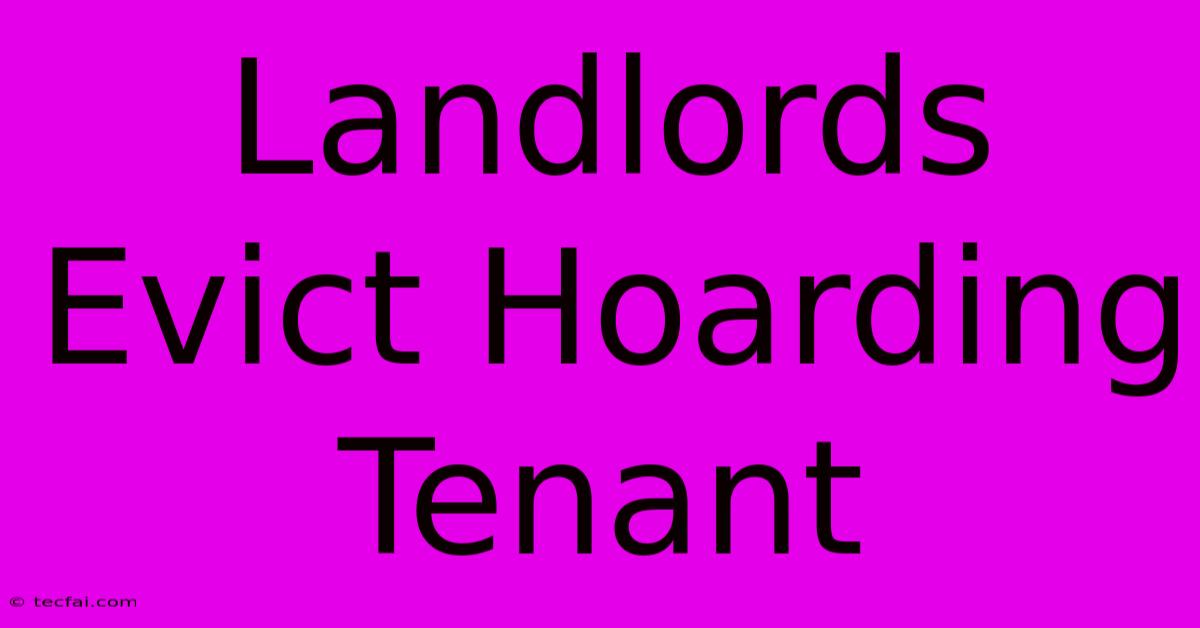Landlords Evict Hoarding Tenant

Discover more detailed and exciting information on our website. Click the link below to start your adventure: Visit Best Website tecfai.com. Don't miss out!
Table of Contents
Landlords Evict Hoarding Tenant: A Legal and Ethical Minefield
Evicting a tenant is never easy, but the complexities multiply exponentially when dealing with a tenant who hoards. This situation presents a unique set of legal, ethical, and practical challenges for landlords. Navigating this requires a careful understanding of the law, tenant rights, and the potential health and safety hazards involved.
Understanding the Legal Landscape
Before taking any action, landlords must be acutely aware of their legal obligations and the specific laws governing evictions in their jurisdiction. Simply put, you cannot evict a tenant without just cause. While hoarding might seem like a clear violation, proving it as such in court requires careful documentation and adherence to legal procedures.
Proving Hoarding as a Basis for Eviction
Many jurisdictions don't specifically address hoarding in tenant laws. Therefore, you may need to argue that the hoarding constitutes:
- Breach of Lease Agreement: Most leases have clauses regarding maintaining a habitable and safe property. Excessive hoarding can violate these clauses by creating unsanitary conditions, fire hazards, or blocking access to essential areas. Crucially, you must have clear, documented evidence of this breach. Photos, videos, and detailed reports from inspections are essential.
- Health and Safety Code Violations: Accumulated hoarded items may create health hazards like pest infestations, mold growth, or blocked fire exits. Local health codes often provide a legal basis for eviction in such cases. Again, thorough documentation is critical.
- Nuisance: Extreme hoarding can create a nuisance for other tenants or neighbors, potentially providing grounds for eviction. This requires demonstrating demonstrable disturbance or harm caused by the tenant's hoarding.
The Eviction Process
The eviction process is highly regulated. Ignoring legal procedures can lead to costly lawsuits and legal repercussions. Key steps usually include:
- Formal Notice: Providing the tenant with written notice of the lease violation, specifying the problem (hoarding) and giving them a reasonable time to rectify the situation. This notice must adhere strictly to legal requirements.
- Legal Counsel: Seeking advice from a real estate attorney is crucial. They can guide you through the legal process, ensuring you comply with all applicable laws and protect your rights.
- Court Proceedings: If the tenant fails to comply with the notice, you may need to file an eviction lawsuit. This requires presenting compelling evidence to support your claim.
Ethical Considerations and Compassionate Approaches
While the legal process is essential, ethical considerations are equally important. Hoarding is often a symptom of an underlying mental health condition, such as obsessive-compulsive disorder (OCD) or anxiety.
Considering the Tenant's Wellbeing
- Attempting Communication: Before initiating legal action, try communicating with the tenant (perhaps with the assistance of a mental health professional). Explain the situation calmly and professionally, outlining the concerns and possible consequences. Offer support and resources if possible.
- Collaboration with Mental Health Professionals: Working with mental health experts can help to approach the situation with sensitivity and provide the tenant with the support they may need. This approach can potentially resolve the issue without resorting to eviction.
Practical Steps for Landlords
- Thorough Documentation: Maintain detailed records of all communications, inspections, and evidence related to the hoarding. This meticulous record-keeping is vital for legal proceedings.
- Professional Cleaning and Remediation: After eviction, you may need professional services to clean and restore the property to a habitable condition. This process can be costly and time-consuming, but necessary for future tenants.
- Preventing Future Occurrences: Review your lease agreement and consider including clearer clauses regarding property maintenance and cleanliness to deter future hoarding issues.
Evicting a hoarding tenant is a challenging process requiring legal expertise and ethical consideration. By carefully following legal procedures, documenting everything meticulously, and approaching the situation with empathy and understanding, landlords can navigate this difficult situation while protecting their property and upholding tenant rights. Remember, seeking legal advice is paramount throughout this process.

Thank you for visiting our website wich cover about Landlords Evict Hoarding Tenant. We hope the information provided has been useful to you. Feel free to contact us if you have any questions or need further assistance. See you next time and dont miss to bookmark.
Featured Posts
-
Natuklasang Maliit Na Bulate
Nov 19, 2024
-
Australia Wins T20 Series Against Pakistan
Nov 19, 2024
-
Teen Stabbed Two Arrested In Birmingham
Nov 19, 2024
-
Lengthy Ban For Bentancur After Son Comment
Nov 19, 2024
-
Bentancur Faces Seven Game Ban For Racism
Nov 19, 2024
